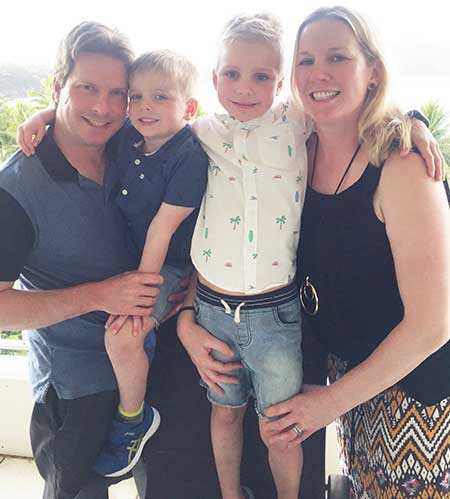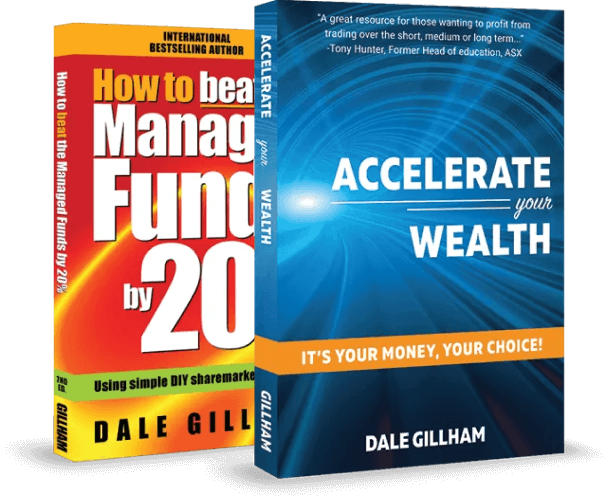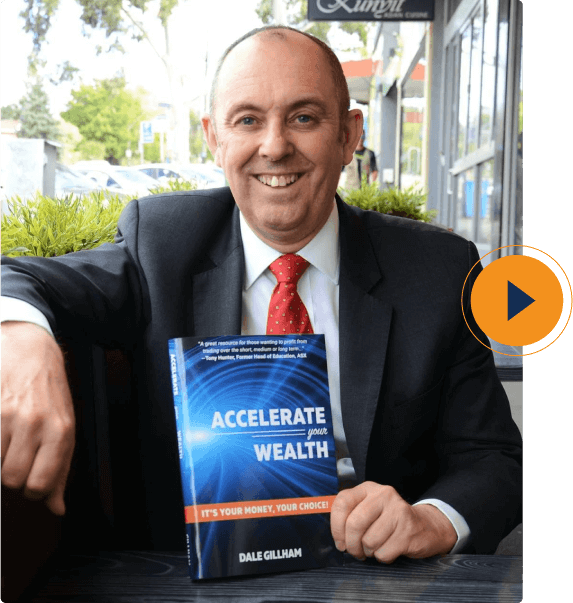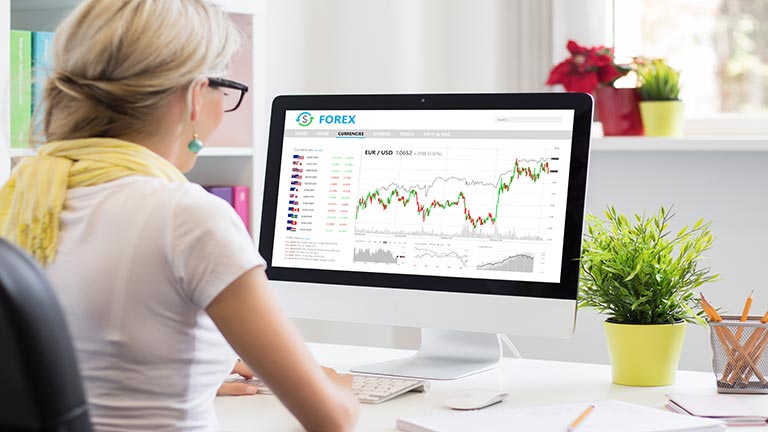Wealth Within Case Studies
Dan Jeppesen Updated Review
An inhabitant of the Surf Coast, Dan Jeppesen used to work full time as a Financial Adviser, however, now trading has become a priority for him. Dan has been trading for 8 years and mainly trades the ASX 300.

How and when did you first become interested in the markets?
Growing up I had a fascination with the stock market and how it operated. It seemed anyone could make money out of it. I particularly remember at high school learning about the market in economics class and watching a show on a Saturday morning about the stock market.
I was learning bits and pieces whenever I could. I wanted to really understand how it all worked, however, I watched from the sidelines as I had no idea what to do. I was a bit cautious and really wanted to have a certain level of knowledge about the markets before I began trading.
And then what happened?
I remember following the ASX from 2005 to 2007 and thinking about how much money I could have made from the rise! Almost every night it seemed there was news about how the ASX kept going up 1-2% each day. All of the big stocks like BHP were doing so well.
Every stock was going up and there was so much good news all the time. The stock market seemed like an opportunity to make easy money!
So, I spent some time learning about the market and the more I looked at the ASX for information, the more I became interested.
There is an endless supply of information about the markets and trading on the internet and I found it hard to decipher what was right and what was wrong. I became too overwhelmed with information from both the internet and books. I was unsure where to get started, what was most important and what was not, and how all the pieces of the puzzle fit together so I could use it to actually make money.
Back in 2009, I decided it was time to take my interest more seriously and seek some quality education so I could get off the sidelines and begin trading. I wanted to achieve my financial goals sooner and have more freedom as I get older, so I can reduce work hours, spend more time with family and experience more travel. I thought there had to be a course out there that could teach me what I need to know without me having to spend months and possibly years trying to piece things together and work out whether the information I am reading is going to get me results.
How have you been able to learn and to educate yourself about the markets?
Initially I learnt as much as I could from the ASX website. There is some good information on that site, but it is quite basic. I read a couple of books, but I wanted to learn about all aspects of trading the markets in detail in an easy to follow structured way, and as I had never traded previously, it was important for me to have some practical hands on experience too. I began researching some courses and came across a company called Wealth Within offering share market education. The course I looked at, the Diploma of Share Trading and Investment outlined everything I wanted, and after enrolling and working through the course I knew I had made the right decision.
I enjoyed learning the tools, techniques and strategies required to be successful long term in the markets. I was so impressed with the Diploma that I completed their Advanced Trading Strategies Course.
I intend to continue my studies and complete the Forex and CFD Trading Course at Wealth Within, as this will allow me to trade shorter term for income.
When I was looking for a course, I found advertisements that said I could watch people trade, and they offered to show me their trading plan. It was only a couple of grand to do this and for me being uneducated at the time this seemed logical, however, I was still not convinced. Now that I am educated, I realise that these guys promoting their trading plans were probably not highly educated in the right strategies, and what they do will not work for everyone.
Did you make mistakes when first starting out?
Yes of course. Fortunately, I had enough knowledge under my belt to minimize my mistakes, so I didn’t blow a lot of money like others have done, and this is something I am very thankful for. It is one thing to learn to trade and to develop a trading plan, but it is another thing to learn the discipline to always follow your trading plan and not to chase trades, particularly in the volatile market I experienced early on. So, you could say that I am happy that I recognised my mistakes early and I learnt from them.
One of the most important lessons I had was how it is imperative that you trust your trading plan and follow it. I would also say that early on in my trading I over-analysed everything and this took up more time and over complicated things. Now that I have the right knowledge, I keep things simple and this allows me to always stay focused on the big picture.
Would you define yourself as a discretionary trader, a mechanical trader or a combination of both?
I am a combination of both, but mostly a mechanical trader. In my first few years into my trading journey I was 100 per cent mechanical in my approach, which I think was important. Now that I have more experience, I can use more of the art of trading and be more flexible with my rules.
When learning to trade properly, I was able to be very disciplined in sticking to my rules. As my knowledge grew, I was able to see so much more on the charts that it gave me the confidence to make decisions in a more discretionary way. So, if I see patterns or sideways moves in price, I know I can manage the trade by weighing up better what the stock is doing. This allows me to build my view on the stock based on solid analysis and the bigger picture, rather than reacting emotionally.
Who have been some of your mentors and role models? What impact have these people made on you personally as well as on your trading style?
Without question it would be Dale Gillham and Janine Cox from Wealth Within. I have learnt a huge amount from them over the years, as they are both willing to pass on their vast amount of knowledge in trading the markets. They also want to see you succeed and provide plenty of encouragement to achieve your goals.
I remember early on Dale saying that you should trade to create a lifestyle, not make it your lifestyle and that has stuck with me over the years. The impact my mentors have had is to enable me to structure my trading system predominantly around a medium-term portfolio. I didn’t want to be in front of a screen all day and I was shown that I could trade to get the results I wanted without having to do that.
I know the way to create the lifestyle I want is through medium term trading. Dale and Janine have encouraged me to prove to myself that medium term trading not only works for me, but can also make me more money with a lot less work, and I have achieved that.
Can you give us a brief overview of your trading style?
Once a month I scan through charts of the ASX300 stocks in Optuma using my technical knowledge. I look at the monthly charts to find stocks that may present trading opportunities over the medium term.
I usually end up with around 40 stocks that look good. I record the fundamentals out of Commsec in a spreadsheet and sort them to find stocks that have double digit growth.
I filter the list down to a handful of stocks using key fundamental criteria that meet the goals of my portfolio and identify which stocks to analyse further. If there is a stock that technically looks good, but the fundamentals have not caught up with the technical analysis, this would not preclude me from trading the stock. The decision would depend on what my technical analysis indicated.
My technical analysis consists of price, pattern and time. I also conduct some back testing on these stocks which allows me to determine the best trading approach to meet my win/loss and profit/loss ratio targets. The stocks then just sit on my watch list until my entry rules are met.
This is very different to my previous uneducated approach, which was focused first on top down analysis using fundamental data.
What I have been taught in the course and at Wealth Within’s Art of Trading workshops is to start with a technical approach and filter down from there. I now realise, that I was probably missing out on a lot of opportunities by focusing on the fundamental data.
Is there any one trade (win or loss) that had a profound effect on your development as a trader? If so, what did you learn from the trade?
Quite a few years ago I was trading M2 Telecommunications (MTU) and I was in a small profit. The stock almost gave an exit signal, however, I decided to sell my holding to lock in profit. As it turns out, the stock then shot up and I missed out on a lot more profit. I didn’t follow my rules and sold. This was early on in my development and I was wanting to lock in that profit, but I must admit I was trading not to lose and so made an emotional decision as MTU had not triggered an exit. I learnt that you should always trust and follow your rules, and let your profits run. Dale has shared this with me many times, but it didn’t hit home to me until I experienced it.
Can you tell us about your best and worst trades?
I take the view that my best trades are the ones where I followed my plan regardless of whether it resulted in a profit or loss. Sometimes in trading you can do everything right and still make a loss. My worst trades are when I haven’t followed my rules, as in MTU, when I sold without an exit signal, or if I did not exit a trade when I should have. I have learnt from my mistakes!
Would you classify yourself as a short-term or a long-term trader? What advice would you offer to people getting started as traders on the relative merits or otherwise of each?
I would classify myself as a medium-term trader, although I’m looking to commence some shorter-term trading strategies to generate cash flow. I learnt when starting out that in order to understand the approach that fits best with my psychology and lifestyle that I first needed to identify why I am trading and the goals and objectives of my portfolio.
I now realise that for the shorter-term time frame that I trade, the more time, knowledge and experience I require as it is higher risk. As my motto now is trade to create a lifestyle, not make it your lifestyle, I focus more on medium-term trading as this allows me more freedom, as opposed to short term trading which is more time intensive. So, my advice to anyone starting out is that they should be clear on what they want to achieve and then they can practice a trading style that suits. For me, trading over the medium term suits my style, and being able to back test stocks properly means I am more profitable.
What markets do you trade, and which markets do you prefer? Do you have a favourite, and why?
I trade stocks on the ASX300 as there are plenty of good quality stocks to be found that provide good trading opportunities. That said, the foundation of my portfolio is stocks in the top 100 but I do trade out to the top 300 using portfolio construction rules I learnt in my trading education.
What makes your trading style different from others? What sets you apart from other traders?
Armed with the quality education I have, I can structure a trading system that is completely suited to my psychology, lifestyle and portfolio goals. Over time, as the market changes, I know I have the knowledge and skills to change my trading approach to remain profitable.
Secondly, it is often said that trading is only 20% technical knowledge and 80% psychology, so I have always placed importance on spending time on my trading psychology. This is an area I know that many traders tend to overlook. And finally, I believe that it’s important to treat your trading as a business and remain disciplined and put in the hard work because you will only get out of it what you put in.
Do you have a favourite trading rule?
I like the old golden rule of cut your losses short and let your profits run. But in terms of actual trading rules, it’s hard to go past Dow Theory and trend lines.
Ed Seykota says, “Everybody gets what they want from the markets.” What do you ‘get’ from the markets?
It has given me control of my future by being able to trade and build up my portfolio over time. This I know will provide my family with many exciting opportunities and choices later in life including, more time with family and friends and plenty of travel. Right now, it has allowed me to reduce work hours from full time to part time.
How has trading affected your lifestyle?
Now that I can trade, I feel in control of my future and know that I will be able to achieve our financial goals sooner. It also provides me with a part time business that I love which is a bonus.
I was working full time as a financial adviser and I still have a small involvement in that industry. I now work part time helping others and so have more time with my family and I would never have been able to have this lifestyle in my role as a financial adviser.
Trading has given me more freedom and flexibility, so I can take one of my boys to school each day and I really enjoy being able to do that.
Before I really didn’t get a lot of quality time with the kids during the week. People have said to me that once the kids get to school, before you know it they are in high school and then they are gone. This really made me stop and think about what I wanted.
What books, seminars and courses have you read or attended, and which would you recommend?
For anyone serious about learning to trade or wanting to take their trading to a new level, I would highly recommend the courses offered at Wealth Within. I have completed the Diploma of Share Trading and Investment and the Advanced Strategies Trading Course.
The course content is of the highest quality and the entire team at Wealth Within is extremely supportive and professional. I have gained a wealth of knowledge through the education they provide. I don’t think there is too much else you need to look at. What is covered in the content is the majority of what you need to be successful and the rest is up to you.
What does the future hold for you?
My focus now is building up my portfolio. Down the track I am looking at building up my super or running my own SMSF, but there are restrictions in superannuation and so it is not a priority. Currently I am focused on paying off our house and building up my trading portfolio outside of super. If you are in your 30s or 40s, I would suggest you be careful about how much you put into super. I say this because if you want to retire and the government lifts the age that you can access the money and you have it all in super, you will have to keep working.
I see myself trading for the rest of my life, I love the challenges and rewards trading provides. Once at a certain level you only need five to ten hours a week and the rest of the week is yours to do what you want to do.
Ultimately my goal is to replace my income from trading and then continue to build up my portfolio, which will enable us to live the lifestyle we choose. I have a clear vision of what I want and know I can achieve it which is exciting, and this drives me to achieve my goals. I can see myself playing more golf, traveling to many different countries and just enjoying life!
Insights From Our Learning Centre


Learn the concepts as to how you can accelerate your wealth using simple DIY investment strategies that will enable you to take control of your investments. Dale Gillham, bestselling author, shows you how to invest with confidence to achieve very profitable returns.
Browse BooksOr Browse By Topic
5 Stars
Years in business delivering high-quality education
of students rate the quality of education as excellent or very good
of students recommend Wealth Within



